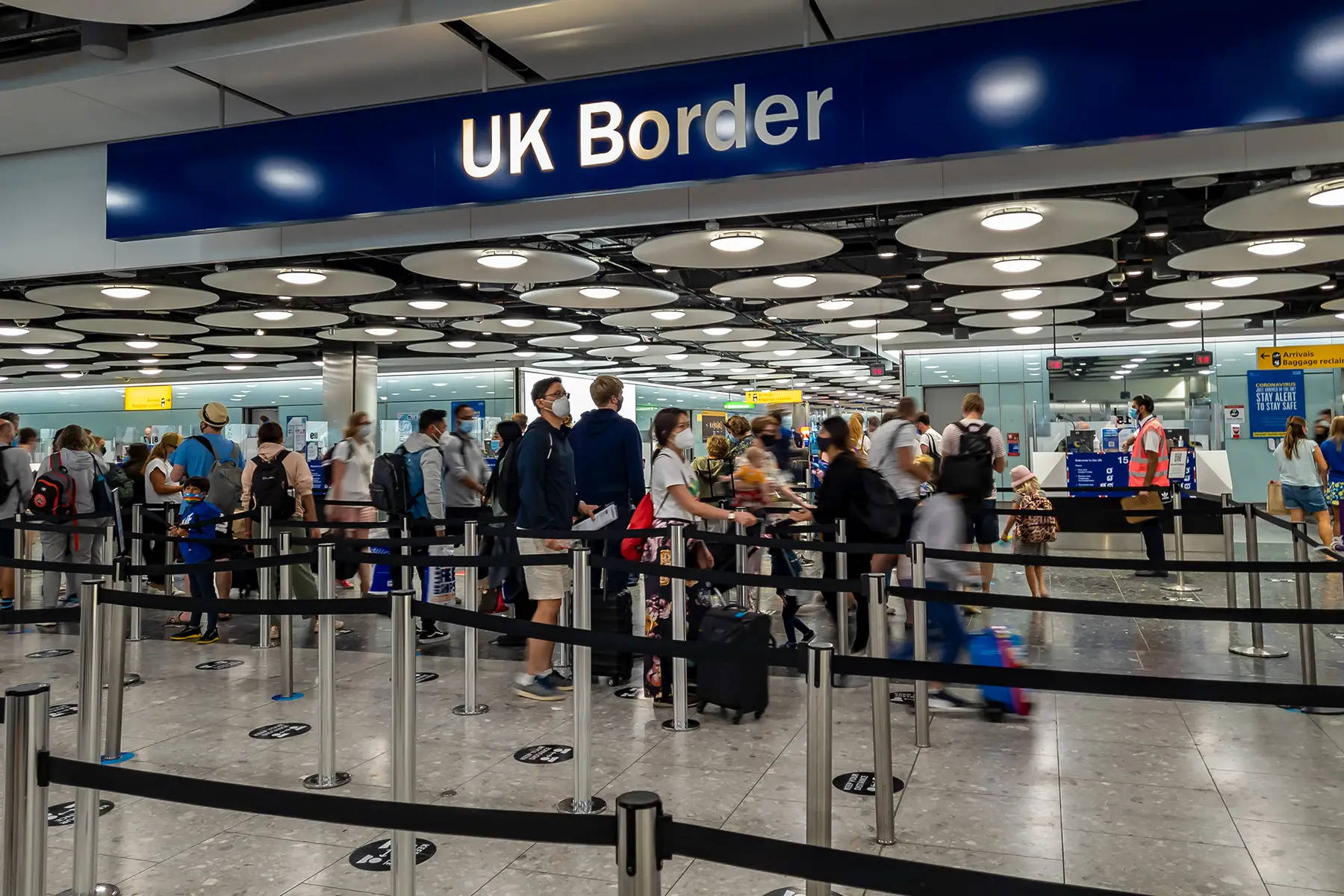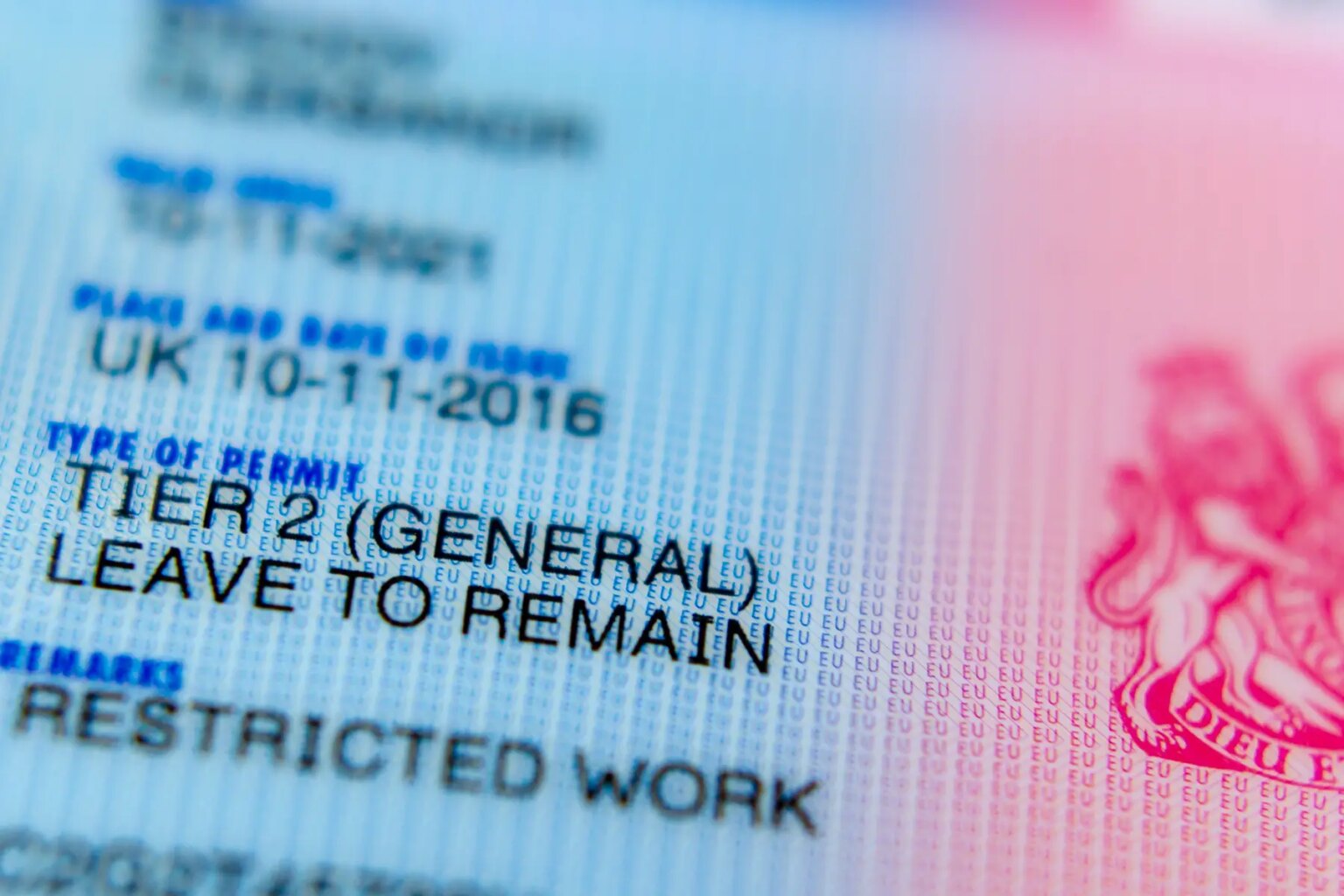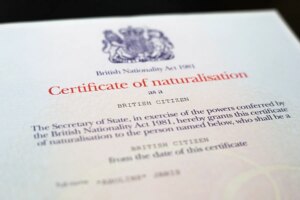Since the country left the EU, the UK’s immigration system has changed significantly. These days, your right to find work in the country depends largely on the type of job you want to do. The UK has a points-based immigration system that is designed to attract workers for skilled and shortage positions. This means that you will usually need a job offer and a UK work visa to enter into employment.
Discover all you need to know about:
- Working in the UK
- Who needs a UK work visa?
- Types of UK work visas
- Short-term UK work visas
- Long-term UK work visas
- Entrepreneur, business start-up, and talent visas
- Work visas in the UK for students
- Volunteering and work experience in the UK
- UK work visas for family members
- Frontier Worker permit for EU nationals
- Appeals and complaints about work visas
- Useful resources
The Relocator
Planning a new life in the UK? Give yourself some peace of mind with The Relocator. On their easy-to-use platform, you'll be able to compare your options quickly, getting quotes from some of the biggest names in global relocations. Move abroad confidently with The Relocator.
Working in the UK
Many people move to the UK to work each year. The country has a good job market, some of the world’s best universities, and its capital is one of the world’s most diverse cities. Although the cost of living is relatively high, the UK scores well overall on the OECD Better Life Index. The average salary is US$33,049 (which is just above the OECD average of US$30,490), there is a minimum wage, and you can apply for social security if you become unemployed.

Around 75% of working-age people in the UK have a job, and around 12% work long hours. Foreign-born residents make up 13.7% of the overall UK population and 18% of the workforce. However, the UK government has imposed restrictions to reduce the number of overseas workers in recent years. For instance, salary thresholds have increased, employers face bigger penalties for employing workers without the right to work in the UK, and EU/EFTA nationals no longer have the freedom to move to and work in the UK following the implementation of Brexit.
The UK now has a points-based immigration system that is designed to attract limited numbers of skilled workers. Under this system, you can apply for a visa if you score a minimum number of points which are based on:
- Skill level of the job
- Offer of work from an approved sponsor
- Salary
- Whether there is a shortage of workers for this occupation
- Educational qualifications
- Your English language skills
The UK Home Office is the government department that is responsible for all UK visas and immigration rules.
Who needs a UK work visa?
Nationals from all overseas countries now need a visa to come and work in the UK. There are a number of countries whose citizens can enter the UK and stay for up to six months without a visa, including EU/EFTA countries, Australia, Canada, Japan, and the US. However, they will need to apply for a UK work visa if they intend to take up employment.
Certain categories of diplomats, government ministers, soldiers, and heads of state are exempt from UK visa requirements. Additionally, citizens of British Overseas Territories and those from Commonwealth countries who qualify for the UK right of abode (ROA) don’t need a visa to live and work in the UK.

If you come to the UK on another visa, for example, a study visa or a family visa, you might be able to work in the UK. Therefore, you should check the terms of your visa. You can also check your UK visa requirements here.
Types of UK work visas
There are generally three types of UK work visas and each one consists of various subcategories. The main work visa types in the UK are:
- Short-term UK work visas
- Long-term UK work visas
- Entrepreneur, business start-up, and talent visas
Short-term UK work visas
Short-term work visas are mostly for temporary work placements in the UK and generally last around six months to a year. You might be able to extend your visa under certain circumstances. Short-term visas are issued for specific types of work and are usually not included within the points-based visa system.
The current short-term UK work visas are:
- Charity Worker temporary visa – for unpaid voluntary work for a charity
- Creative Worker temporary visa – for work in one of the creative industries; for example, a dancer, actor, musician, or film crew member
- Government Authorised Exchange temporary visa – for work experience or training placements
- International Agreement temporary visa – to do work that is covered by an international law or treaty; for example, working for a foreign government or servant in a diplomatic household
- Religious Worker visa – for non-pastoral religious work
- Seasonal Worker visa – for work such as fruit picking, farm work, or driving heavy goods vehicles (HGV)
- Youth Mobility Scheme visa – for young people who are aged 18-30 with at least £2,530 in savings and meet other eligibility requirements
- Graduate visa – for graduates that want to stay in the UK to work after completing a UK study course
Requirements
Aside from the specific work requirements related to the type of short-term visa, you will usually need to have been offered a position from a licensed sponsoring organization. In most cases, you will also need to have at least £1,270 in savings to support yourself during your stay. For some short-term visas, you also need to be at least 18 years old.
It is worth noting that most short-term UK work visas do not grant you access to public funding such as unemployment benefits. However, you can access free healthcare through the NHS, although you will usually need to pay the healthcare surcharge, which is currently up to £624 a year. Your partner and any dependent children can usually join you too, although they will typically need to make separate visa applications.
How to apply for a short-term UK work visa
You can apply online (see the individual links above) or through one of the worldwide UK visa application centers. To do this, you will need to provide the following:
- Valid photo ID
- Sponsorship reference number
- Evidence of personal savings, for example, bank statements
- Tuberculosis test results if you are entering from certain countries
You will also need to submit your biometric data at a visa application center, or scan your ID documents online or via the UK Immigration: ID Check app, to get your biometric residence permit (BRP).
Applications can usually be made up to three months before your intended travel date, and the decision on your application can take up to eight weeks.
Visa costs
As of 2022, most short-term UK work visas cost £259, plus the healthcare surcharge. The Graduate Visa costs £715. In addition, you usually have to pay around £20 to provide biometric information for the BRP. However, be aware that these prices are subject to change.
Visa length
Most short-term visas are valid for a maximum of two years. They are typically issued for one year and can then be renewed, although some visas have a two-year validity but are non-renewable. The graduate visa can be for up to three years if you have completed your Ph.D. studies.
The main exception to this is the seasonal worker visa, which is usually for up to a maximum of six months.
Long-term UK work visas
These are visas that are typically valid for between two and five years and are renewable. Because they entitle the holder to a longer residency in the UK, often with the chance of eventually applying for permanent residence or UK citizenship, they have higher requirement thresholds. Current long-term UK work visas are:
- Skilled worker visa – for skilled workers that usually have to meet minimum requirements in the UK points-based system
- Health and Care Worker visa – for medical professionals to work for the NHS or in adult social care
- Senior or Specialist Worker visa – for employees of overseas companies to work at a UK branch
- Minister of Religion visa – for senior positions within a UK-based faith organization
- International Sportsperson visa – for elite sportspeople or qualified sports coaches
- Representative of an Overseas Business visa – for sole representatives of foreign businesses looking to set up a branch or subsidiary in the UK
Requirements
To qualify for most long-stay work visas in the UK, especially skilled worker positions, you must score 70 points through the points-based system. This consists of 50 points that every applicant needs to meet, which are:
- Offer of work from licensed sponsor (20 points)
- Job at appropriate skill level (20 points)
- Minimum level English skills, usually at least B1 on the Common European Framework of Reference (CEFR) scale (10 points)
You can then make up the remaining 20 points from the following:
- Salary of £25,600 or the going rate for the profession, whichever is higher (20 points)
- Job in an official shortage occupation (20)
- Ph.D. in a STEM subject relevant to the job (20)
- Salary of between £23,040 and £25,599 or at least 90% of the going rate for the profession, whichever is higher (10)
- Ph.D. in a non-STEM subject relevant to the job (10)

In addition to this, you need to have at least £1,270 in savings to support yourself. Notably, you can usually work up to 20 hours per week in another additional job, as long as the work is relevant and you continue in your existing role. However, you won’t be able to access public funds such as unemployment benefits. Your partner and dependent children can accompany you but they need to get their own visas.
Naturally, minimum salary requirements are different for certain jobs in the UK. However, employers must still pay at least £10.10 an hour (or £20,480 for jobs in healthcare or education). For Senior or Specialist Worker visas, the minimum pay is £42,400 unless you are traveling on a Graduate Trainee program.
How to apply for a long-term UK work visa
You can apply online or through one of the worldwide UK visa application centers. To do this, you will need to provide the following:
- Valid photo ID
- Sponsorship reference number
- Proof of knowledge of English, unless you are traveling from an English-speaking country
- Details of your employer
- Your job title, salary, and occupation code
- Evidence of savings, for example, bank statements
- Tuberculosis test results if you are from a country where you have to take the test
- Criminal record certificate for certain jobs
You will also need to submit your biometric data at a visa application center, or scan your ID documents online or via the UK Immigration: ID Check app, to get your biometric residence permit (BRP).
Applications can usually be made up to three months before your intended travel date, and the decision on your application can take up to eight weeks.
Visa costs
Long-term UK work visa costs vary from £464 to £1,418 depending on the visa type and length. You will also usually need to pay the healthcare surcharge (usually £624 a year) to use NHS services in the UK. The Health and Care Worker visa is cheaper, costing between £232 and £464. Meanwhile, International Sportsperson visas cost £244 if they are for 12 months or less.
In addition to this, you will usually have to pay around £20 in fees for the BRP.
Visa length
These visas are typically valid for up to five years but can usually be renewed indefinitely. Notably, you can only stay in the UK for a maximum of six years on a Minister of Religion visa. Senior or Specialist Worker visas are valid for a maximum of five years in any six-year period (or nine years in any ten-year period if your salary is over £73,900).
You can change jobs or switch employers with most long-term UK work visas as long as you still meet the eligibility requirements and the employer is a licensed sponsor. However, you will need to update your visa.
Entrepreneur, business start-up, and talent visas
There is currently no general visa for people wanting to work as a freelancer, be self-employed, or start their own business in the UK. However, there are a few visas for those who meet particular conditions. These are as follows:
- Innovator visa or Start-up visa – these are for people that have a new business idea that is different from anything else on the market in the UK
- Global Talent visa – if you have been recognized as a leader in academia, research, arts and culture, or digital technology
Requirements
You generally need an endorsement from a recognized endorsing body to apply for one of these visas. For the Global Talent visa, you can apply without endorsement if you have won a global award in your field. In addition to this, applicants for all visas need to be at least 18 years old and demonstrate a good level of English (usually minimum B2 on CEFR scale). You will also need to show at least £1,270 in savings for the Innovator or Start-up visa. For the Innovator visa, you need an additional £50,000 of business investment capital per applicant if you are setting up a new business.
While on your visa, you will have restricted access to public funds. Moreover, those on an Innovator visa cannot take up any employment outside of their own business. And while partners and dependent children can join, they need to get their own visas.
How to apply for a UK business-related visa
You can apply online (see the individual links above) or through one of the worldwide UK visa application centers. To do this, you will need to provide the following:
- Valid photo ID
- Proof of savings, for example, bank statements
- Proof of investment capital if starting a business on an Investor visa
- Evidence of minimum English language requirements, unless you are coming from an English-speaking country
- Tuberculosis test results if you are from a country where you have to take the test
You will also need to submit your biometric data at a visa application center, or scan your ID documents online or via the UK Immigration: ID Check app, to get your biometric residence permit (BRP).
Applications can usually be made up to three months before your intended travel date, and the decision on your application can take up to eight weeks.
Visa costs and length
The standard costs for these visas are currently:
- Innovator visa – £1,021
- Start-up visa – £363
- Global Talent visa – £608

You will also usually need to pay the healthcare surcharge (usually £624 a year) to use NHS services in the UK.
Initial visa lengths are two years for Start-up visas, three years for Innovator visas, and five years for Global Talent visas. However, all three visa types are renewable and you can eventually apply for settlement or UK citizenship if you meet all the eligibility requirements.
Work visas in the UK for students
While you can work in the UK on a student visa, the hours you can work will depend on your studies and whether or not the work is during term time. Importantly, you cannot work as a professional sportsperson or sports coach, or become self-employed.
Students who are aged 16 or 17 in the UK and on a child student visa may work up to 10 hours a week during term time and full-time during vacations. They may also take up work placements. However, those studying English language courses on a short-term study visa may not do paid work.
If you graduate from a UK course on a student visa, you can apply for a Graduate visa which entitles you to stay in the country for two years and look for work. Notably, this extends to three years if you are graduating as a Ph.D. student.
Volunteering and work experience in the UK
There are two visas for volunteering and work experience in the UK. These are the Charity Worker visa for volunteering in the charity sector, and the Government Authorized Exchange visa for work experience or training placements.
For both of these visas, you will need sponsorship from a licensed sponsor and will need to meet the personal savings requirements for UK work visas. These visas cost £244, plus the healthcare surcharge, and are valid for a maximum of two years.
You can do paid work in a second job that is not linked to your placement as long as it meets the eligibility requirements and doesn’t exceed 20 hours per week.
UK work visas for family members
You cannot work if you are joining family members coming to the UK on a work visa, as you will be traveling as dependants; meaning that the partner or parent with the visa is responsible for supporting you. You will need to apply for separate visas, which are valid for the same length, and pay fees.
If you apply for a UK family visa to join relatives who are already UK residents, you can work in the UK unless you apply for a visa to get married or start a civil partnership in the UK. Similar to those on work-related visas, you won’t have access to most public funds in the UK.
In addition to the standard visa requirements, you will need to show evidence of your family relationship, for example, a birth or marriage certificate. If you are a spouse or partner, you will need to have been in the relationship for at least two years. You and your spouse/partner will also need a combined annual income of £18,600 plus additional money if you have children.
The standard cost for a UK family visa is £1,523 plus healthcare surcharge costs. Most are valid for two years and nine months but are renewable.
Frontier Worker permit for EU nationals
EU/EFTA citizens working in the UK but living in another country can apply for a Frontier Worker permit. However, they need to have begun working before 31 December 2020. This permit allows you to work, rent accommodation, and access certain benefits and services such as healthcare in the UK.
To be eligible, you need to be working in the UK at least once a year and live primarily outside the UK, which usually means at least six months a year in another country.
The permit is free and usually lasts for two years, but can be renewed. You can apply online either outside or inside the UK.
Appeals and complaints about work visas
You can ask for an administrative review of the decision if your UK work visa application is refused. This costs £80 and you can apply for a review online. If you are told you are not eligible for a full review, you might be able to make a ‘reconsideration request‘ to the UK immigration authorities.
Just bear in mind that the administrative review can be a lengthy process and can take up to six months.
For general complaints about services provided by the UK visa and immigration authorities, you can file a complaint online. You will normally receive a response within 20 working days, or 12 weeks if the complaint is considered to be serious or complex.
If you are not happy with the outcome, you can ask for a review which can take up to another 20 days. Following this, you can take the matter to the Parliamentary and Health Service Ombudsman if you are still unsatisfied.
It is worth noting that appealing a visa decision can sometimes be a costly and lengthy exercise. Because of this, it is wise to get free advice before proceeding. Citizens Advice can provide you with support and signpost you to free or low-cost legal services.
Useful resources
- UK Visas and Immigration – the Home Office department that is responsible for UK work visas
- Citizens Advice – provides guidance on several topics for people living in or moving to the UK









